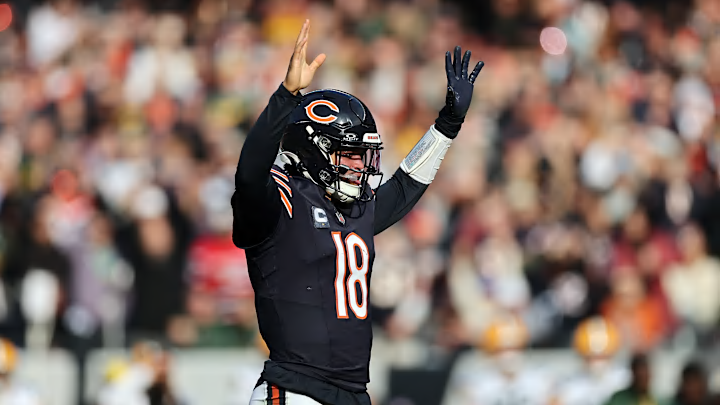11. The painful number of consecutive losses the Chicago Bears have suffered to their supposed arch-rival Green Bay Packers. For much of this losing streak, and even for the stretch of the rivalry before the start of the 11-game streak, the discourse surrounding the rivalry often started and ended with who lined up under center on both sides.
The Bears, with their rotating carousel of quarterbacks, versus the Packers, with their methodical succession of elite QB to elite QB to elite QB, has been difficult to watch at times (actually, all of the time). Whether it was Cutler averaging almost 2 interceptions a game when he played the Packers, Trubisky's inconsistent play, and Fields' penchant for taking bad sacks, the Bears QB always shouldered the blame for these losses.
Did you know that, by passer rating and turnovers, Justin Fields' 11/16 passing for 148 yards with 0 TD, 0 Int in week 18 of the 2023 season, a game the Bears lost 17-9, is the second-best game by a Bears quarterback during the 11-game losing streak to the Packers?
Most fans will admit that they know the issues go deeper; be it coaching, roster construction, drafting. The Bears have issues, but the largest slice of the pie when explaining away Packers losses always comes down to the QB disparity.
Now it's Caleb Williams' turn to carry the weight of this rivalry. With all his flashes came all the rookie moments, and on a day when hardly anyone expected anything from the Bears, he gave them a glimpse at what this rivalry might look like if, for one day, the disparity in QB play between these two teams would not be a deciding factor.
In his first game in this rivalry, Caleb Williams more than showed he belonged on the same field as Jordan Love. Accumulating 300 total yards, an 83.8 QBR (higher than Jordan Love's 80.3). In terms of passer rating and turnovers, he had arguably the best game any Bears QB has had in this rivalry during the 11-game losing streak. However, the result was the same: A Bears loss. While disappointing, this loss does come with one important lesson:
The Chicago Bears' struggles against Green Bay have more to do with the disparity between how each organization is run versus the quarterback play
Yes, quarterback play is important, and yes obviously organizational competence is reflected in how well a team develops their quarterbacks so these two do go hand-in-hand. However, when it comes to Bears-Packers, there is no greater evidence of this than what was witnessed Sunday when the Bears did have equally strong quarterback play and offensive production as their rivals, but still found a way to blow the game.
Packers LB Edgerrin Cooper on Bears K Cairo Santos : "On film, on his past games, we seen him how he was kicking it low, so we knew we had a good chance [of blocking]. ... We've been emphasizing it so much this week. Coach Rich, he even said he'll be upset if we ain't get one."
— Kalyn Kahler (@kalynkahler) November 17, 2024
The Packers were sharp in the details when the Bears weren't, making it the second time this season that the Bears' lack of attention to detail cost them a victory against a good team. Missing the details in close games is not a characteristic isolated to the game, it's the result of multiple levels of the organization taking the details for granted and letting the negative impact of these mistakes build up over time without accountability. It's also why in 2022 when the Bears hired their new head coach, who wanted to recruit Rich Bisaccia to be his special teams coordinator, he lost him to the more stable organization up north.
Take the Steelers for example. Lamar Jackson is arguably the second greatest QB of his generation, a level of production the Steelers have not generated at any point in Lamar's career in Baltimore. Yet, the Steelers are 4-1 against Lamar Jackson with their starting QBs including an aged Ben Roethlisberger, Kenny Pickett, and most recently, an aging Russell Wilson.
Quarterback play is not the only reason a team loses 11 straight games to its division rival, and Sunday's Bears' game featuring two QBs playing at arguably the same level is the latest piece of evidence that the issues the Bears need to overcome are deeper than 'bad quarterback luck'
